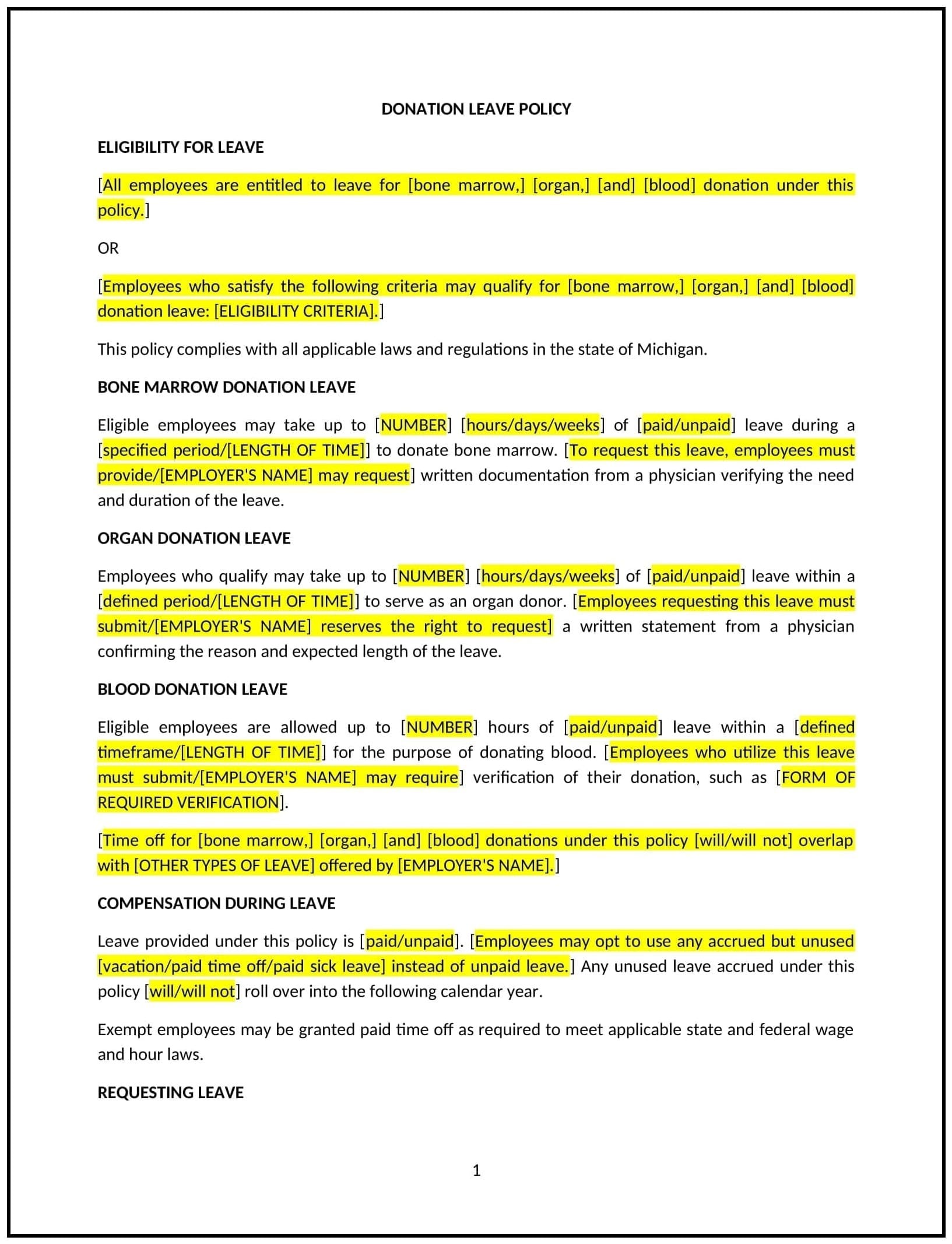Got contracts to review? While you're here for policies, let Cobrief make contract review effortless—start your free review now.

Customize this template for free
Donation leave policy (Michigan)
A donation leave policy provides Michigan businesses with guidelines for offering paid or unpaid leave to employees who wish to donate their time to charitable causes. This policy supports corporate social responsibility by encouraging employees to participate in community service and volunteer efforts while maintaining a healthy work-life balance.
By adopting this policy, businesses can demonstrate their commitment to giving back to the community, improve employee morale, and foster a culture of volunteerism and engagement.
How to use this donation leave policy (Michigan)
- Define eligibility: Clearly state which employees are eligible for donation leave, including full-time, part-time, or temporary employees, and any minimum tenure or performance requirements for participation.
- Set the leave allocation: Specify how much leave can be taken for donations, such as a set number of hours or days per year, and whether leave is paid or unpaid.
- Identify eligible activities: Outline the types of charitable activities that qualify for donation leave, such as volunteering at nonprofit organizations, assisting with disaster relief, or participating in fundraising events.
- Provide approval procedures: Set a process for requesting donation leave, including who employees should contact, what documentation is required (e.g., proof of volunteer activity), and how far in advance requests should be made.
- Specify limitations: Establish any limitations on donation leave, such as limits on the number of employees who can take leave at the same time or restrictions on leave during critical business periods.
- Address coordination with other leave policies: Clarify how donation leave interacts with other types of leave, such as paid time off (PTO), sick leave, or vacation leave, to avoid confusion and ensure fair use of benefits.
- Promote transparency: Make the donation leave policy easily accessible to all employees and include it in employee handbooks, intranet, or onboarding materials.
Benefits of using this donation leave policy (Michigan)
This policy provides several key benefits for Michigan businesses:
- Enhances corporate social responsibility: By encouraging employees to volunteer, businesses contribute to positive social impact and build a reputation as a community-minded organization.
- Improves employee engagement: Offering donation leave shows that businesses care about their employees’ values and well-being, leading to higher employee satisfaction and morale.
- Strengthens employee retention: Employees are more likely to stay with a business that supports their personal and philanthropic interests, improving retention rates.
- Increases positive brand exposure: Engaged employees who volunteer in the community help boost the business’s public image and attract customers who value corporate responsibility.
- Builds team cohesion: Donation leave programs can foster a sense of teamwork and camaraderie as employees work together for shared causes, strengthening workplace relationships.
Tips for using this donation leave policy (Michigan)
- Communicate the policy: Ensure that employees are aware of the donation leave policy through internal communications, the employee handbook, and onboarding materials.
- Track leave usage: Monitor donation leave to ensure that it is used fairly and in accordance with the policy, and maintain records of leave taken for auditing purposes.
- Encourage participation: Actively promote the policy to employees and encourage participation in community service and charitable activities, either through internal communications or company-sponsored events.
- Offer incentives: Consider providing incentives, such as recognition or matching donations, to further encourage employees to participate in charitable activities.
- Review regularly: Update the policy as needed to reflect changes in Michigan laws, company priorities, or employee needs related to charitable involvement and volunteerism.